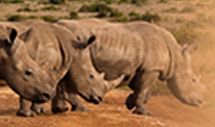By Deputy Minister Barbara Thomson
[[{"type":"media","view_mode":"media_large","fid":"405106","attributes":{"class":"media-image","height":"142","id":"1","style":"width: 110px; height: 142px; float: left; margin: 3px;;","typeof":"foaf:Image","width":"110"}}]]Cabinet in August 2014 approved the integrated strategic interventions for the management of rhinoceros in South Africa.
This integrated management plan is aimed at reducing the threat to rhino and enhancing the biological management of the species. The interventions include compulsory actions such as improved security, increasing the rhino population, enhancing international and national collaboration and cooperation, and long-term sustainability measures such as the creation of alternative economic opportunities for communities bordering protected areas; creating incentives to promote or facilitate rhino ownership, and the consolidation of rhino population across different land-uses in South Africa including national, provincial, private and communal land.
Over and above pro-active anti-poaching initiatives, one of the short-term actions will see the translocation of an estimated 500 rhino from the Kruger National Park to national and provincial reserves, as well as private and communal land within the natural distribution range for rhino (within and outside South Africa). This means translocating rhino to areas where they are at a low risk of poaching.
The purpose of translocation is also to increase the rhino population. Due to the high density of the rhino population in parts of the Kruger National Park, the animals have stopped reproducing. By moving some of the rhino out of the area to alternate safe areas, the population is expected to increase – not only in the Kruger National Park, but also in the areas the rhino are moved to.
Included among the African range states for rhino are Botswana, Namibia, Kenya and Zimbabwe. South Africa has recently donated 20 Black rhino to Botswana as part of the process to establish viable populations in range States. The cooperation between South Africa and Botswana will be formalised through a Memorandum of Understanding currently being discussed by the two countries.
By moving our black and white rhinos to range states such as Botswana, we are simply doing our bit as the Department of Environmental Affairs to ensure the protection of our wilderness.
I will never forget the sight of the bodies of baby rhinos after their horns were brutally hacked off by poachers. Some of their horns were only few centimetres long, but that did not stop those bent on destroying our wildlife.
We, as the government, came to realise that if we are not able to protect our natural resources or our natural heritage, we will eventually not be able to protect ourselves. Therefore, it is imperative to do something now.
Some might believe we are running away from the battle field, or even claim that we have lost the battle altogether against rhino poaching.
But, the battle is not lost. The government, SANParks and private individuals and organisations are doing all in their power to end the menace we are faced with the onslaught on our rhino.
The fact that South Africa continues to house more than 80 per cent of the world’s rhino population, and that that population continues to grow despite the increased number of deaths from poaching, is, to us, an achievement.
This, and the efforts being undertaken by government, SANParks and private individuals to save the rhino for posterity, including through translocation, is an assurance that we will come out of time of concern as victors.
As the Department of Environmental Affairs we are the custodians of the South African wilderness. We are the ones authorised to carry forth measures to conserve our rich biodiversity for generations to come.
If we don’t protect our rhino now we will be putting our country, and the millions of people who will call it home by 2030, at a risk of not being able to experience, or benefit from, such an iconic animal and import part of the Big Five.
Our conservation is being depleted far too quickly by the greedy.
Let us stand together to fight and protect the rights of our beautiful wildlife and wilderness. Let us stand together and stop the brutality being perpetrated on our rhinos.
We all need to be inspired by the importance and relevance of our natural world in the betterment of our lives. We, as Human Beings, need to become relevant to future generations by choosing to save our rhino. So don’t cheat your conservation by doing nothing. Step out from the crowd and say “not in my watch”.
Barbara Thomson is Deputy Minister of Environmental Affairs





